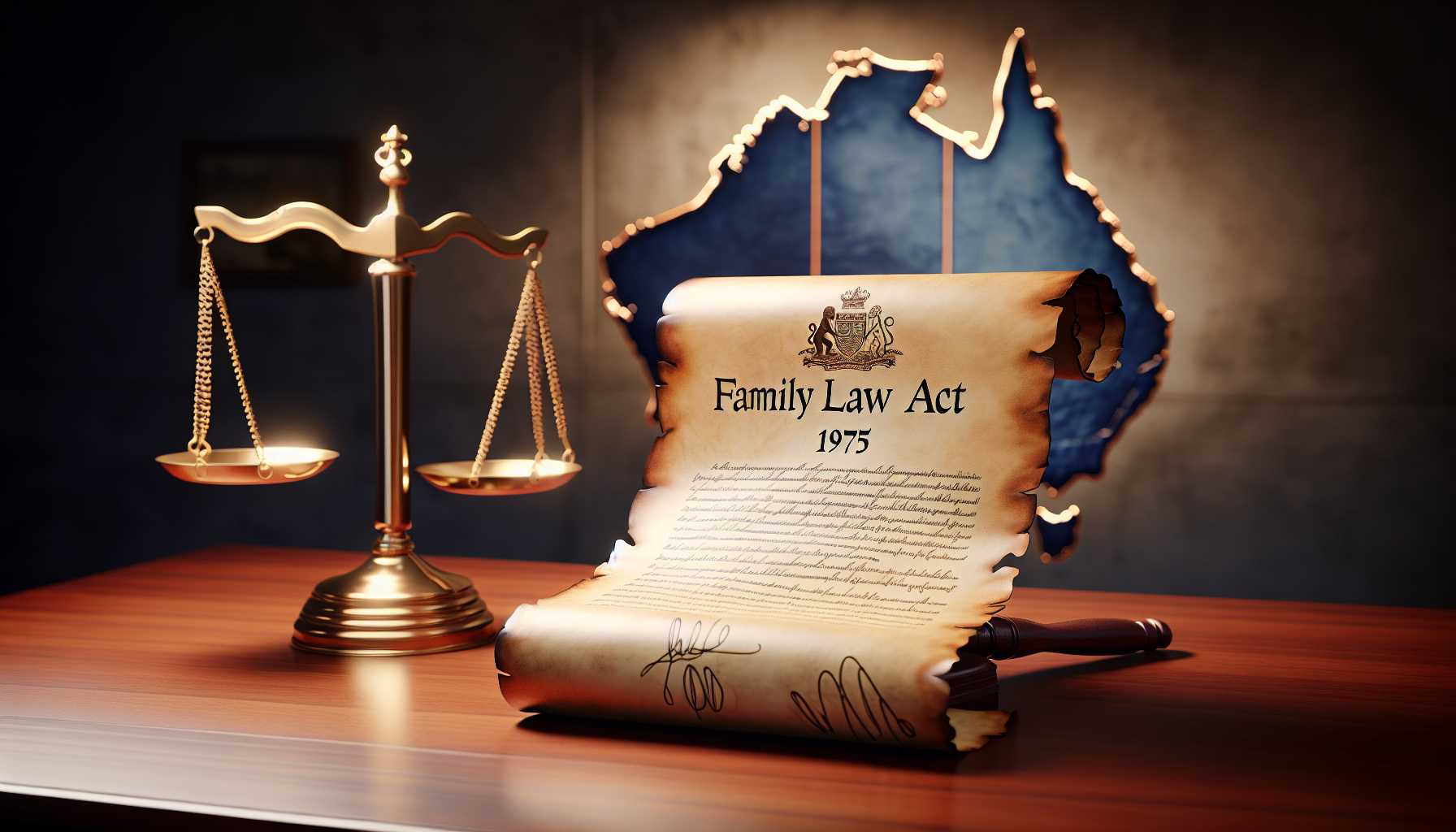When dealing with family legal issues in Australia, you may feel confused and overwhelmed. Our introduction to family law in Australia can help answer your questions about divorce, child custody and property settlement. We’ll explain how Australian courts handle these personal matters under the Family Law Act 1975. Our guidance is designed to give you clear and concise insights that are easy to understand without using complex legal language. This information will help you confidently navigate the complexities of family legal proceedings.
Key Takeaways
- The Family Law Act 1975 is central to Australian family law, establishing the Family Court and setting fundamental principles for parental responsibilities, children’s rights, and property settlement in divorce and separation cases.
- Australia’s family law system is a dual structure, with the federal system handling parenting and property matters and state/territory systems dealing with child protection and domestic violence, emphasising dispute resolution before litigation.
- Family dispute resolution is a mandated step before court action in parenting disagreements, whereas, for financial matters, child support and spousal maintenance are determined based on factors like income and needs, guided by principles within the Family Law Act 1975.
Understanding the Family Law Act 1975

The Australian Family Law Act of 1975 is an important law that helps deal with the complications arising from family disputes. It sets up and regulates the operations of the Family Court of Australia, which is responsible for dealing with cases under its jurisdiction, as mentioned in the Family Court Act. The act encourages alternative methods to resolve disputes before going for legal proceedings.
This legislation prioritises protecting children’s well-being by promoting meaningful relationships with both parents and safeguarding them from harm like an attentive parent would do. Defining parental responsibilities covers all aspects of their duties, powers, and authority over their children. Through family court intervention or mediation services if necessary. Parenting arrangements that prioritise child welfare are established.
The law also outlines principles guiding property settlements during divorce cases while empowering courts with reallocating marital assets between parties involved.
Children’s Rights and Parental Responsibilities

The Family Law Act 1975 is a law that prioritises the best interests of the child and promotes the involvement of both parents in their lives. Parenting arrangements can be unpredictable, just like the sea. When orders related to children are not followed, there may be consequences depending on the severity of the situation.
With continual evolution and adaptation to changing family needs through amendments in family law legislation, the Act holds great significance by establishing equal shared parental responsibility for each parent as a fundamental principle concerning matters concerning children. This encompasses all duties, powers, responsibilities, and authority that parents have towards their children, focusing more on safeguarding the rights of these minors rather than solely concentrating on parental rights.
Property Division

Property division is a complex process per the Family Law Act 1975 guidelines. It takes many factors into account to ensure fairness. The court evaluates the contributions made by each party during the relationship and their future needs before dividing assets and property equitably. These assets may include family homes, investment properties, land holdings, household items, vehicles, and any debts or financial obligations.
One notable aspect of the law is its equal treatment for married couples and de facto partners regarding property division after separation. The same principles apply regardless of marital status or type of relationship between parties involved, both are entitled to pursue court orders for fair distribution following termination of their partnership.
The Australian Family Law System

The Australian Family Law System comprises two separate regimes – one federal and the other state or territory-based. The federal regime deals with matters related to parenting and property, while the state/territory regimes are responsible for child protection laws and domestic violence issues. Cases involving family law are heard by both the Federal Family Law Courts and various courts at the local level across Australia.
A significant player in this system is the Federal Circuit and Family Court of Australia, which has jurisdiction over a broad range of civil matters regulated under Australian federal law. In addition, it deals with some criminal offences and works alongside state/territory courts to prevent family violence and protect those who are vulnerable. The court issues orders aimed at safeguarding individuals from harm.
Federal Family Law Courts
The Federal Family Law Courts of Australia are responsible for managing family disputes. These courts have jurisdiction over various legal matters, including parenting and property issues, migration law, administrative law, and admiralty cases. They hold the authority to handle divorce applications, spousal maintenance requests, child custody battles, and property division conflicts.
The court uses an organised approach to categorise each case based on its complexity level before assigning it to the appropriate division. This ensures appropriate dispute resolution mechanisms are utilised to address these complex family disputes. The overall process involves:
- Filing divorce applications with supporting evidence.
- Seeking spousal maintenance.
- Tackling financial concerns related to properties/assets.
Sometimes, it may be necessary for individuals involved in such matters to attend court proceedings so that proper formalities can take place. Families rely on this established system, guided by trusted principles, to provide solutions when dealing with complicated familial situations.
The federal family law courts remain vigilant in facilitating clear solutions while ushering them towards sound resolutions. This is similar to how sailors depend on lighthouses during treacherous times.
State and Territory Courts
The State and Territory Courts serve as the protectors of the Australian family law system, specifically when addressing cases involving family violence. These courts utilise procedures like issuing protection orders to safeguard individuals, especially families and children, from the harmful effects of family violence. They have jurisdiction over two protection orders: Family Violence Orders (FVOs) and Personal Protection Orders (PPOs).
One must fill out an online form specific to their state or territory to obtain a protection order. While this process may be challenging at times, proper guidance can ultimately lead to finding a safe haven amidst turmoil for those affected by domestic abuse within their families.
Want to find the right Family Lawyer? We offer a comprehensive directory of experienced lawyers. Connect with your ideal legal expert now!
Key Areas of Family Law

As we explore the vast domain of family law, we encounter a few key aspects that stand out, like distant islands. These include the grounds for divorce and separation, which necessitate proof that the marriage has broken down and requires a minimum separation period of 12 months. The process involves physically living apart from one’s spouse with no intention or possibility of reconciling.
Moving on to parenting arrangements, according to the Family Law Act 1975, these must be reached without any pressure or coercion to ensure fairness through voluntary decision-making.
Finally, our journey brings us to financial matters such as child support payments, typically determined by the Child Support Agency (CSA). The factors taken into account during this assessment may vary from the income levels of each parent and the number of children involved, all while considering how much time is spent between them.
Divorce and Separation

In Australia, a no-fault divorce system is in place, which means that a marriage can only be dissolved if it is deemed irretrievably broken down. This requires living separately for at least 12 months with no chance of reconciliation. To obtain a divorce, individuals must prove that their marriage has reached an irreversible point.
In addition, there are several grounds for seeking an annulment of marriage in Australia, including situations where:
- Sexual relations did not occur.
- The couple never resided together.
- Family violence was present.
One party expresses remorse about entering the union or any other valid reason determined by the court.
You can refer to our guide for a stress-free divorce process.
Parenting Arrangements

The Family Law Act 1975 provides essential guidance for parenting arrangements. It requires the court to prioritise children’s best interests when making decisions. It defines shared parental responsibility as encompassing all aspects of duties, powers, responsibilities, and authority that parents hold to their children.
The Act promotes fair agreements between parents without any influence from threat or coercion. It emphasises voluntary decision-making based on the child’s best interests rather than solely on parental rights. If both parties cannot reach an agreement, either parent can seek a resolution by applying to the Court, which may issue a formal parenting order.
Financial Matters

Navigating financial matters in the context of family law can feel uncertain and complicated. Under the Family Law Act 1975, parents are legally responsible for providing sufficient financial support for their children. Australian Family Law determines this obligation by multiplying the Costs of Children with each parent’s share of combined income.
In Australia, spousal maintenance is assessed by considering various factors such as:
- Both parties’ financial needs and capabilities
- Age and health
- The duration of the marriage or de facto relationship.
- Individual income, assets, and resources.
- Responsibilities towards any children involved.
These considerations are crucial in determining an appropriate amount and time frame for spousal maintenance.
The court follows principles outlined in the Family Law Act 1975 when deciding about property settlements after divorce or separation cases arise under Australian family law jurisdiction.
Regarding child support obligations from separated couples within Australia’s family law framework, the Income % difference between them plays a key role when considering expenses related to raising kids together. Children must receive adequate parental care through responsible guardianship following relevant legal guidelines provided.
Want to find the right Family Lawyer? We offer a comprehensive directory of experienced lawyers. Connect with your ideal legal expert now!
Dealing with Family Violence and Abuse

The Family Law Act 1975 outlines provisions that define family violence as any form of violent, threatening or controlling behaviour by one person towards another in a family relationship, including exposing children to such effects. This law aims to protect families, especially children, from domestic violence during legal proceedings.
One difficult aspect within this area is child abuse, which is also addressed under Section 4 of the Family Law Act 1975. This provision encompasses situations involving actual or potential harm inflicted upon a child within their family environment. It sets out guidelines for legal professionals and courts when dealing with allegations related to child abuse cases and ultimately prioritises the safety and wellbeing of all involved children.
Protection Orders
Protection orders offer a sense of security in family violence. These orders are designed to impose restrictions on individuals to protect others from harm. Depending on the jurisdiction, these orders can take various forms, such as Apprehended Domestic Violence Orders (NSW), Intervention Orders (VIC and SA), Violence Restraining Orders (WA), and Family Violence Orders (TAS, ACT).
To obtain a protection order under Australian family law, an individual must fill out an online form or an interactive PDF customised to their specific state or territory. Violating a protection order is a criminal offence that may result in fines of up to $24,000 or other penalties as determined by the court.
Family Law and Child Abuse
The Family Law Act 1975 is crucial for dealing with child abuse. It says that courts must quickly and carefully handle any claims of child abuse or family violence, focusing on keeping children safe and well. Child abuse includes things like assault (even sexual), being exposed to inappropriate acts, or being forced into sexual activities.
In family law cases involving child abuse or domestic violence claims, the court looks at the evidence to see if a child has been harmed or is in danger. If you suspect any child abuse – physical harm, sexual abuse, mental abuse, or neglect – it’s very important to report it.
If you need help starting legal action, contact “Family Courts Violence Review” immediately.
Navigating the Family Law Process
To seek legal advice for matters related to family law in Australia, individuals should:
- Contact the Family Relationship Advice Line or other available resources offering free legal information and guidance.
- Consider trying mediation or Family Dispute Resolution before resorting to court actions.
- In Australian family law cases, disputes are resolved through a process called Family Dispute Resolution (FDR), facilitated by an impartial third party known as a FDR Practitioner. This involves assisting separating families in reaching agreements through mediation.
Family dispute resolution becomes mandatory when there is disagreement over childcare arrangements after separation. Separated parents must undergo this resolution process before taking action in the family court system.
Seeking Legal Advice

Getting legal counsel for family law issues in Australia is very helpful. They can guide you through the complicated aspects of family law, protect your rights and prevent violations. They can help with child custody and support issues, allow you to make informed decisions, and push the resolution process easier.
Having a lawyer is crucial if you want to benefit from their expertise when dealing with family-related legal issues. Australian family lawyers have a lot of experience handling relationship breakdowns. They can help solve disputes with court representation, settlement negotiations, and mediation sessions. They can also offer emotional support throughout the process.
Family lawyers specialising in The Family Law Act 1975 can accurately guide you on your rights and responsibilities. They know the law well and can help you make good decisions regarding important issues like child custody arrangements, resolving disputes between separating couples, and other related aspects. Government-recognised counselling centres can provide guidance if you need help with any aspect concerning kids. They offer best practice solutions to help you.
Family Dispute Resolution
Family Dispute Resolution (FDR) is a type of mediation for family disputes. It helps to resolve conflicts in family law cases. This process offers numerous advantages, such as:
- Enabling parties to take charge of their own decisions
- Preserving interpersonal relationships
- Reducing time and costs associated with court processes
- Fostering transparent communication and collaboration
- Facilitating mutually agreeable resolutions.
Family Dispute Resolution Practitioners (FDRPs) help people resolve family disputes. They guide the parties involved in the dispute to reach agreements that work for everyone.
Court Proceedings
The first step is submitting an Initiating Application and other necessary documents, such as a Financial Statement for financial cases and a Genuine Steps Certificate and Questionnaire for parenting cases. These applications and all required forms must be filed electronically on the Commonwealth Courts Portal.
Participating in family law court proceedings involves following procedures, including attending initial events, directions hearings, interim hearings, dispute resolution processes, interviews by Court Children’s Services and reports prepared by them. A compliance and readiness hearing may also occur before proceeding to a final hearing or trial, where one presents their case accompanied by cross-examinations.
Failure to comply with family law court orders can lead to severe consequences, including penalties imposed directly from the courts themselves.
Overview of Family Law in Australia

As we near the end of our informative journey, let us take a moment to acknowledge the wide range of family law in Australia. The primary goal of the Family Law Act 1975 is to support marriage and family life. This includes addressing legal issues within family relationships and focusing on children’s rights and responsibilities.
The Australian system for handling family matters deals with resolving legal aspects related to family breakdowns, such as divorce, spousal maintenance, property and financial concerns. These areas are primarily governed by the Family Law Act 1975.
In terms of courts that handle these matters at a federal level, there are the Federal Circuit Court and Family Court (FCFCA), while each state or territory has its significant court – like Western Australia’s Family Court – which falls under this national framework for managing families’ legal affairs.
Need immediate legal advice on family matters? Get guidance from family law specialists now!
Summary
The Family Law Act 1975 prioritises children’s best interests and ensures fair parenting and property arrangements. The system comprises federal and state courts that work together to support families and protect individuals from harm. Despite challenges, there is always a guiding lighthouse to help you along the way.




